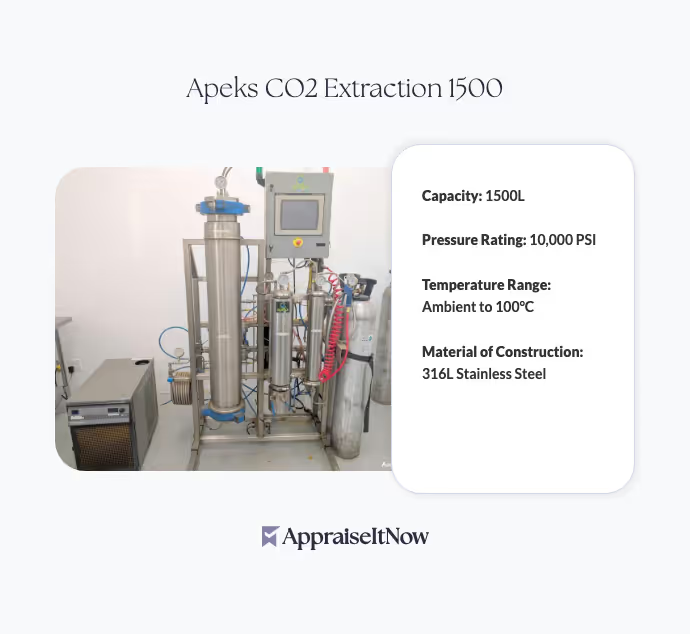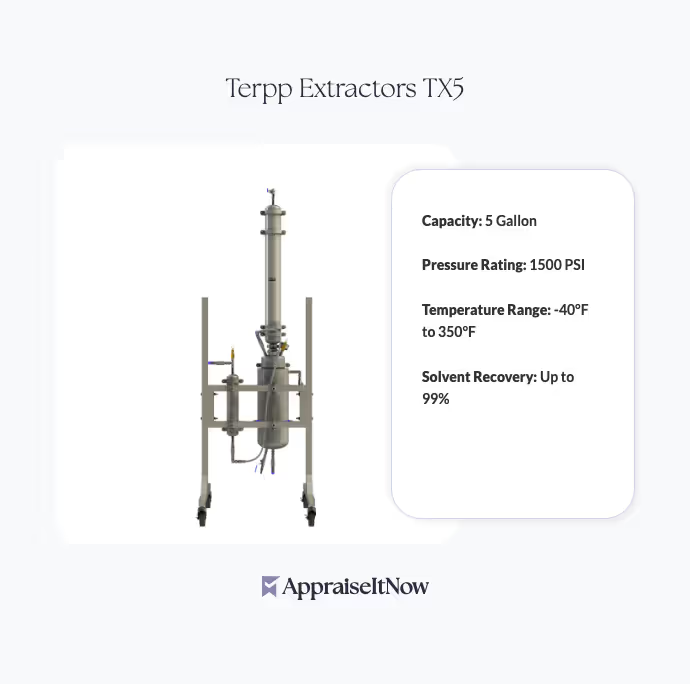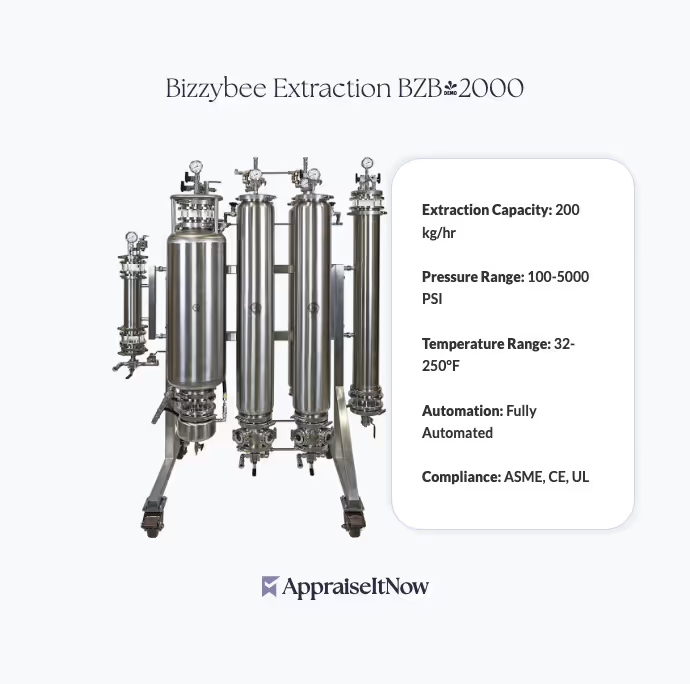<h1>How to Get Your Apeks CO2 Extraction 1500 Appraised</h1>
<p>The Apeks CO2 Extraction 1500 represents a significant industrial investment, with market values ranging from <strong>$100,000 to $150,000</strong> depending on condition, usage history, and maintenance records. Whether you're buying, selling, financing, or insuring this advanced supercritical CO2 extraction system, obtaining an accurate professional appraisal ensures you have proper documentation and realistic market positioning for your equipment.</p>
<h2>Understanding Your Apeks CO2 Extraction 1500's Market Position</h2>
<p>Your extraction equipment operates in a highly specialized market where multiple factors influence value beyond the initial purchase price. The Apeks CO2 Extraction 1500's industrial-grade capabilities—including its massive 1500L capacity, fully automated control systems, and ability to achieve 99.9% pure extracts—make it a cornerstone asset for commercial-scale processors, research laboratories, and extraction facilities. Since its introduction in 2015, this system has established itself as a premium choice in the extraction industry, commanding strong demand from operators seeking reliable, large-scale production capability.</p>
<div class="callout tip"><p><strong>Market Insight</strong></p>
<p>Industrial extraction equipment depreciates differently than standard machinery—market demand, regulatory changes, and technological advancement significantly impact annual value retention rates.</p></div>
<h2>Key Factors That Influence Your Apeks CO2 Extraction 1500's Value</h2>
<p>When professional appraisers evaluate <a href="/types/cannabis-equipment">cannabis equipment</a> like your extraction system, they examine a comprehensive set of variables that collectively determine fair market value. The age of your unit matters considerably, but equally important are the run-hours accumulated, maintenance documentation, and any upgrades or modifications performed over its operational life.</p>
<p>The condition of critical components directly impacts valuation. Appraisers inspect the CO2 system's pressure vessels, pump assemblies, temperature controls, and safety certifications to assess remaining useful life. A well-maintained unit with documented service logs showing regular maintenance can command valuations 15-25% higher than comparable equipment lacking such documentation. Conversely, units with deferred maintenance, missing components, or worn parts typically see 20-40% value reductions, with replacement costs estimated based on current OEM pricing.</p>
<p>State cannabis regulations and licensing restrictions significantly affect your equipment's marketability and thus its appraised value. Equipment certified for use with hazardous materials in states with permissive cannabis programs holds stronger market value than identical units in jurisdictions with restrictive licensing or pending regulatory changes. Your Apeks system's 5-year warranty and compliance certifications become crucial selling points in regulated markets where equipment legitimacy and legal status matter tremendously to potential buyers and lenders.</p>
<div class="callout note"><p><strong>Regulatory Consideration</strong></p>
<p>Equipment in states undergoing cannabis licensing moratoriums or facing regulatory uncertainty may see temporary valuation pressure, but historical resilience suggests values recover as regulatory clarity emerges.</p></div>
<h2>What Documentation Appraisers Need</h2>
<p>Professional appraisers specializing in <a href="/blog/the-basics-of-cannabis-equipment-appraisal">cannabis equipment appraisals</a> require specific documentation to establish accurate valuations. Your serial number, original purchase invoices, and maintenance records form the foundation of any credible appraisal. Service logs documenting routine maintenance, part replacements, and any repairs performed provide appraisers with a clear picture of the equipment's care history and remaining operational life.</p>
<p>Beyond maintenance records, appraisers need certification documentation proving your Apeks 1500's compliance status and any modifications you've performed. Original parts lists and current inventory of spare components factor into valuation, as does documentation of any upgrades or improvements made to the original equipment. If your unit has been used in a commercial operation, production records showing processing volumes and batch efficiency can support higher valuations by demonstrating consistent performance and revenue generation.</p>
<h2>Selecting the Right Appraisal Approach for Your Transaction</h2>
<p>Different transaction contexts require different appraisal methodologies, and professional appraisers adjust their approach based on your specific needs. For sale purposes, market approach appraisals comparing your unit to recent comparable sales provide the most relevant valuation framework. If you're financing your equipment or seeking a loan, lenders typically require cost approach or income approach appraisals that establish either replacement value or revenue-generating capacity.</p>
<p>Insurance appraisals often employ replacement cost methodology, establishing what you'd need to spend to acquire equivalent equipment today—a figure typically higher than fair market value given current manufacturing and logistics costs. Tax appraisals for depreciation or charitable donation purposes follow yet different standards, sometimes utilizing income approaches that project future extraction revenue. Understanding these distinctions helps you communicate your appraisal purpose clearly with qualified professionals, ensuring they deliver documentation suitable for your intended use.</p>
<div class="callout tip"><p><strong>Pro Tip</strong></p>
<p>Clarify your appraisal purpose upfront—whether sale, financing, insurance, or tax—so your appraiser delivers the appropriate methodology and conclusions.</p></div>
<h2>Industry Benchmarks and Depreciation Patterns</h2>
<p>Established depreciation schedules for <a href="/blog/what-factors-impact-cannabis-equipment-appraisal-value">extraction equipment</a> show that industrial-grade systems like the Apeks 1500 typically retain 70-75% of original purchase value in years two through four, assuming normal maintenance and moderate use. This retention rate exceeds general industrial machinery, reflecting both the equipment's specialization and strong secondary market demand from operators seeking quality used extraction systems.</p>
<p>Usage intensity represents the most significant factor affecting depreciation rates. A unit processing 500-750 pounds of biomass monthly typically depreciates more predictably than equipment operating at capacity (1,000+ pounds per batch), as higher utilization accelerates component wear and reduces remaining useful life. Most appraisers estimate useful life at 10-12 years with normal maintenance, meaning a 2015-model Apeks 1500 still has 4-7 years of productive capacity remaining, supporting mid-range valuations within the $100,000-$150,000 spectrum.</p>
<h2>Modifications, Missing Components, and Replacement Costs</h2>
<p>Non-OEM modifications or missing original components can substantially reduce your Apeks 1500's appraised value. Replacing the fully automated control system—one of this equipment's most sophisticated and expensive components—costs approximately $15,000-$25,000, creating immediate valuation reductions when original systems are damaged or missing. Similarly, worn pump assemblies, temperature control inconsistencies, or pressure vessel issues trigger replacement cost estimates that appraisers deduct from base market value.</p>
<p>Conversely, documented upgrades that enhance performance, safety, or compliance can support valuations at the higher end of the range. Professional-grade monitoring systems, improved cooling capabilities, or software upgrades that increase processing efficiency typically add value proportional to their documented improvement in production capacity or product quality. Appraisers distinguish between value-adding modifications and cosmetic changes, focusing on improvements that genuinely enhance the equipment's operational capability or extend its useful life.</p>
<h2>Appraisal Turnaround Times and Fee Structures</h2>
<p>Professional appraisals for high-value <a href="/types/equipment-and-machinery">equipment and machinery</a> in the $100,000-$200,000 range typically complete within 5-15 business days following initial inspection. Standard appraisal fees for equipment of this value and complexity generally range from $1,500 to $3,500, though rates vary based on appraiser credentials, market location, and whether on-site inspection is required. Rush services compressing turnaround to 2-3 days typically add 25-50% to standard fees.</p>
<p>AppraiseItNow connects you with credentialed appraisers across the U.S. who provide fast turnaround without sacrificing accuracy. Our network of specialists experienced in <a href="/blog/everything-you-need-to-know-about-cannabis-equipment-valuations">cannabis equipment valuations</a> understand the specific factors affecting Apeks system values and deliver USPAP-compliant documentation suitable for lending, insurance, and sale purposes.</p>
<h2>When In-Person Inspection Is Essential</h2>
<p>For equipment valued above $75,000, in-person physical inspection is industry standard and often required by lenders and insurers. Your Apeks 1500's size (over 5,000 pounds fully assembled) and complexity make on-site assessment particularly important, as appraisers need to verify component condition, operational status, and safety compliance directly. During an on-site inspection, qualified professionals conduct pressure tests, examine all major assemblies, verify serial numbers, assess structural integrity, and photograph the equipment from multiple angles for documentation.</p>
<p>Desktop or virtual appraisals relying solely on photographs and descriptions, while faster and less expensive, provide limited value assurance for equipment of this caliber and price range. Lenders almost universally reject desktop appraisals for equipment financing above $100,000, and insurance companies increasingly require verified in-person assessments for high-value coverage. If geographical constraints make on-site inspection challenging, establishing an in-person assessment through a local certified appraiser remains the prudent approach to protect both your transaction and your documentation credibility.</p>
<div class="callout note"><p><strong>Industry Standard</strong></p>
<p>Professional appraisers experienced with <a href="/types/lab-equipment">lab equipment</a> and extraction systems recognize that equipment of this value demands in-person verification to ensure accurate valuations and defensible conclusions.</p></div>
<h2>Appraiser Credentials Matter</h2>
<p>The credentials of your chosen appraiser directly impact the credibility and acceptability of your appraisal. Look for professionals holding certifications from recognized organizations including <strong>ISA (International Society of Appraisers)</strong>, <strong>ASA (American Society of Appraisers)</strong>, <strong>AAA (American Association of Appraisers)</strong>, <strong>CAGA (Canadian Association of Garden Appraisers)</strong>, or <strong>AMEA (American Metals Evaluators Association)</strong>. These designations indicate formal training, adherence to the <strong>Uniform Standards of Professional Appraisal Practice (USPAP)</strong>, and commitment to continuing education in appraisal methodologies.</p>
<p>When evaluating appraisers for your Apeks 1500 valuation, verify USPAP compliance explicitly, as this standard governs ethical conduct and ensures your appraisal meets requirements for legal proceedings, financing, and insurance purposes. Experience with cannabis equipment specifically matters significantly—appraisers familiar with extraction systems understand the regulatory environment, market dynamics, and technical factors affecting valuations in ways general equipment appraisers often miss. Our guide on <a href="/blog/how-to-choose-the-right-cannabis-equipment-appraiser">choosing the right cannabis equipment appraiser</a> provides detailed guidance on credential verification and appraiser selection.</p>
<h2>The Importance of Market-Driven Valuations</h2>
<p>Current market demand for used Apeks CO2 Extraction 1500 units in North America remains robust, with resale prices typically ranging from $85,000 to $140,000 depending on condition and documentation. This secondary market strength reflects genuine operator demand for reliable, large-capacity extraction systems at pre-owned pricing. Operators seeking to expand production capabilities often prefer proven used equipment over purchasing new systems, as the five-year-old technology delivers nearly identical extraction quality at substantially lower cost.</p>
<p>Understanding these market realities helps you set realistic expectations for your equipment's value. Appraisers track recent comparable sales, regional price variations, and current market absorption rates to establish defensible valuations grounded in actual transaction data rather than theoretical replacement costs. By obtaining a professional appraisal reflecting genuine market conditions, you gain confidence that your equipment is accurately valued for buying, selling, or financing purposes.</p>
<div class="callout tip"><p><strong>Market Reality</strong></p>
<p>Secondary market strength for proven extraction equipment like the Apeks 1500 supports relatively stable valuations, making this equipment more resilient than general industrial machinery during market softness.</p></div>
<h2>Protecting Your Investment Through Documentation</h2>
<p>Comprehensive appraisal documentation serves purposes far beyond establishing a purchase or sale price. For insurance purposes, a certified appraisal creates the agreed-value basis ensuring replacement coverage at fair market value should loss occur. In financing situations, lenders rely on appraisal conclusions to establish loan-to-value ratios and determine acceptable advance rates. For estate planning or tax purposes, professional appraisals provide the documentation needed for equitable asset distribution or accurate depreciation calculations.</p>
<p>Whether you're seeking an appraisal for your Apeks CO2 Extraction 1500 through AppraiseItNow or another qualified service, prioritize appraisers who deliver detailed reports including equipment descriptions, condition assessments, market analyses, and clear valuation conclusions. This level of documentation transforms an appraisal from a simple price estimate into a professional asset evaluation suitable for all transactional contexts and stakeholder requirements.</p>
<hr />
<div class="callout note"><p><strong>Key Takeaway</strong></p>
<p>A certified appraisal of your Apeks CO2 Extraction 1500 provides the accurate, defensible valuation you need for buying, selling, financing, or insuring this significant industrial asset. By working with qualified, credentialed appraisers who understand extraction equipment markets and cannabis industry dynamics, you ensure your equipment is properly valued and documented to support your transaction or financial planning objectives.</p></div>
















